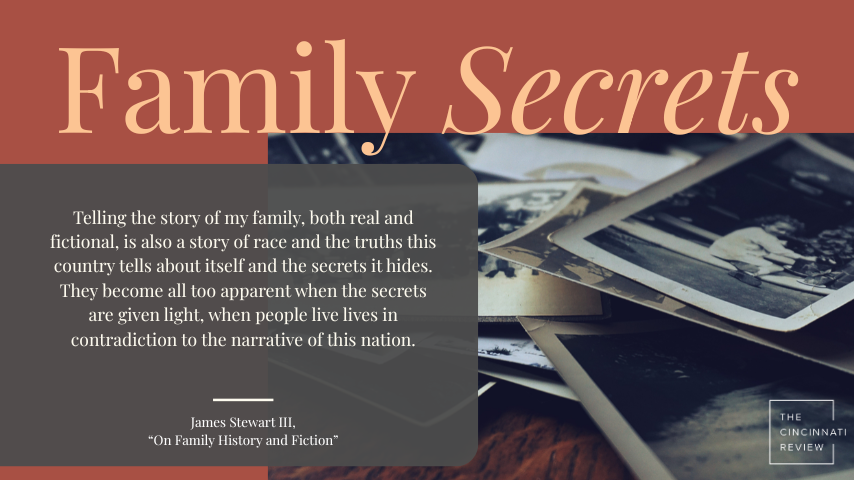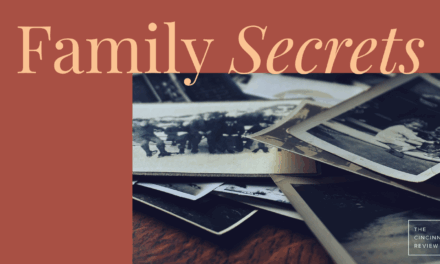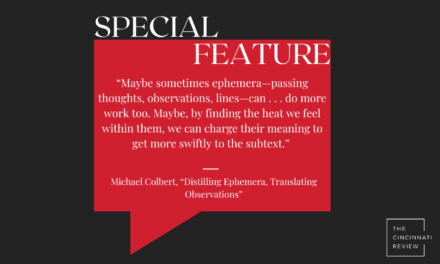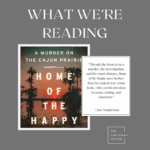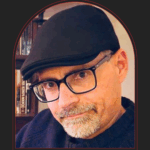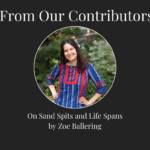12 minutes read time
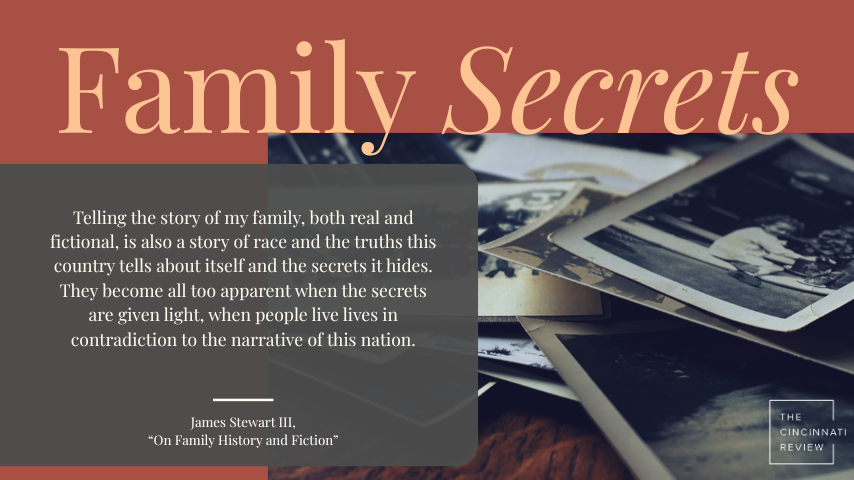
To accompany our spring 2025 issue (22.1), we have curated a folio on family secrets (reviews and craft essays), after noticing that several pieces in the print issue include that theme. Here is James Stewart III’s craft essay on fiction:
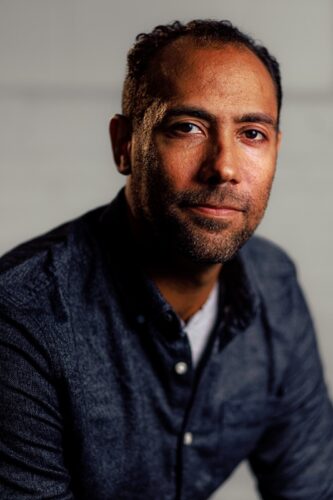
On Family History and Fiction
In the mid-’80s, after a job promised to my father in California failed to materialize, our family was forced to return to Chicago, broke again. We left to regroup at my grandmother’s home on the city’s South Side, where my father had grown up. We’d save to get a place of our own again, and hope for a better outcome. My father, Jim, sent my two-year-old self and his pregnant wife ahead on a plane. He and his preteen stepson, Nathan, packed our worldly possessions into a U-Haul and drove two thousand miles through the blistering summer heat without air-conditioning and with only Culture Club’s 1983 album, Colour by Numbers, to listen to through the vast stretch of middle America that falls between radio signals.
Hitched to the back of that U-Haul was my father’s most prized worldly possession, a ’76 Camaro Rally Sport, black with red racing stripes on the hood, and the leather interior upgrade. He’d bought it before becoming a family man, an extravagance he’d worked too hard for to part with. Somewhere along that two thousand miles of road, the car disappeared. According to my father, someone had stolen it right off the back of the moving U-Haul, like a scene out of The Fast and the Furious. That’s the extent of the story, according to our family’s oral history. It’s possible but not probable.
To me, it’s more likely that something else happened. And when I put this scene in a novel, which I wanted to feel grounded in everyday events, a high-speed heist didn’t seem right, so I looked elsewhere. In my book, a more believable alternative is that Jim didn’t hook the car up to the hitch properly or that it was stolen when they stopped somewhere along the way. Just plain old everyday bad luck. The story I wanted to tell hinged on making the “ordinary” incredible, which meant molding the raw material of these stories to fit the novel’s truth.
My debut novel, Defiant Acts (Acre Books, 2025), is a fictionalized account of growing up in a mixed-race, working-class family in 1992. My household—both fictional and real—is a family of seven. A white mother, Black father, two white teenage brothers, and three young kids, two brothers and a sister, who share the same parents. The novel is a tribute to the people who raised me, to these everyday heroes who had to overcome incredible obstacles to live a life on their own terms.
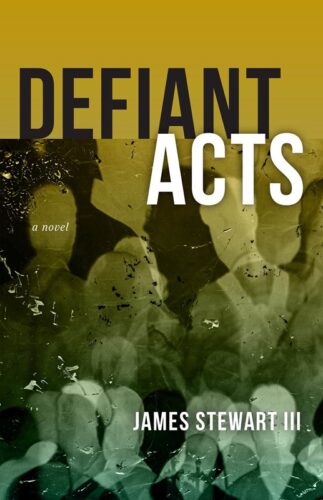
However, telling the story of my family, both real and fictional, is also a story of race and the truths this country tells about itself and the secrets it hides. They become all too apparent when the secrets are given light, when people live lives in contradiction to the narrative of this nation. When I was in middle school, my mom told me we were going to visit her father in the city. A retired Chicago Police Department officer, he was nearing the end of his battle with a brain tumor. What made this unusual is that my two younger siblings and I had never met him before, despite living only an hour’s drive away. While my parents rarely talked about this situation, I’d long known that her mother and her father wanted nothing to do with their daughter after she married a Black man.
My mother’s relationship—or lack thereof—with her parents was our family secret. But the funny thing is that, of course, everyone knew. Secrets are nothing more than truths we don’t want to hear because of the shame or guilt that accompany them. In my case, our secret mirrors the shame at the heart of the American experiment—the racist truth buried in white family histories. The reason fascist forces in this country are trying to suppress Black stories, Black history, is because of the reflection white society sees of itself through our eyes, a shameful truth.
Many chapters in the book were inspired by stories like the one that began this essay. I found it complicated to choose what to take from family history, even the secrets, and what to invent. However, that was made easier by the oral nature of these stories, which aren’t detailed or concrete accounts. Instead, they’re snapshots, and with every retelling, each story has lost more and more details to time and memory until the core nugget of the event has become solidified. The narrative turns into a few lines that become gospel. I suppose this is just the nature of oral storytelling, but in the realm of literary fiction, this approach leaves much to be desired. So I would often take these small private stories as a launching point for a literary investigation or reimagining. Every now and then I’d reach out to family about some impossibly small detail, but for the most part, I wanted to fill in the blanks myself: Yes, this is kinda sorta what happened, but not really.
I complicated the matter of truth and fiction further by keeping nearly all the names of the fictional characters the same as their real-life counterparts. At the beginning of the process I lied to myself, saying that it’d be temporary, that their real names were placeholders, but it never felt right to change them, to provide yet another layer between fiction and reality. I could say, This isn’t my little brother, Mason—it’s Jason; they just share a lot of the same traits. But that felt dishonest, a cop-out. Not until writing this essay did I figure out the real reason behind this decision—and it’s an admittedly selfish one. It’s that I love these people so much that I want the world to know they’re mine, that we’re each other’s.
* * *
The cross-country road trip was the first time my dad and brother had been together alone for such an extended period of time. My brother was about ten, and my father was in his early thirties. There’s a story here, of two people trying to connect in the seemingly mundane in-between time, that’s hard to tell as someone who wasn’t there. Fiction writers are always chasing the answers to the question “What did that feel like?” Generally it only leads to more questions: In this case, how do relationships become stronger? Do any of the things we have to say—the planned speeches—ever stick, or do the smallest, most thoughtless actions end up being the most memorable? These are the gaps that fiction fills in.
Of course, you could ask why I didn’t write a memoir. Because that wouldn’t feel true, I’d say. I think our memories are more fiction than fact, a secret we keep from ourselves to firm up our sense of self, and conversely, fiction can come closer to sharing some facts or to quantifying emotions. It’s the closest I can come to sharing what it’s like to love and to fight for that love. The fiction writer’s ability—or rather their responsibility—is to consider the panoply of perspectives that make up the world. With this in mind, I wrote my novel as fragmented and polyvocal. Race and class are a constant pressure, but their effects manifest radically differently for a Black man from Chicago’s South Side and a white kid worried about trying to fit in at another new school. I wanted each character to have room to show who they are and what they’re dealing with; after all, a family isn’t a single unified narrative but always fractured by our singular perception of reality. The best we can hope for is coming together when we need to.
We don’t experience life as in a well-crafted realist novel, one event clearly leading to another, the future occasionally foreshadowed. Instead, time feels like a rush of random events, one after another, some good, some bad. The vast majority don’t seem particularly meaningful as we move through life trying to get enough food and water in us to continue living. These events become even more precarious the further down you are on the socioeconomic ladder. Toward the bottom, a single mistake or stroke of bad luck (which you’re already more vulnerable to due to a lack of resources and opportunities) can lead to wildly varying outcomes. It was important for me to maintain this sense of precarity in the novel, one we didn’t make evident to others at the time—the shame that accompanies this instability another secret. All to say, to properly convey this precariousness the novel needed to be less plotted. It needed to be messy and unpredictable.
This form for fiction mirrors memory, leaving room for the “small” events as well as the big ones. I feel that I should remember so many more moments than I do; even the “milestones” evade me so that the majority of what I’m left with, what we’re all left with, are flashes or impressions. The times my mother would walk in with laundry fresh out of the dryer and throw it over me on a chilly winter day or that time I took the wrong bus home and was too scared and embarrassed to tell the driver until all the other kids had gotten off. These impressions linger and can be just as telling as the big things.
* * *
It wasn’t even until my early thirties, nearly a decade ago, that I’d been able to see my family as “interesting” from a fiction-writing standpoint. I’d been fascinated by this whole fucking race thing since kindergarten, when my family had come for a Show-and-Tell activity, and a little blond girl in a swishy pink-and-purple jacket on the playground afterward asked “Why is your mommy white and your daddy Black?”
I didn’t know the ways I was primed to tell this story, the lineage of these stories. At a precarious time in my life, and with no real idea how to be a writer, I enrolled in a master’s program at North Central College, a small liberal arts college in Naperville, Illinois, to provide some sort of direction and momentum to my life. If nothing else, it’d force me to write and think. In a class with Richard Guzman, we read Black Writing from Chicago: In the World, Not of It? (Southern Illinois University Press, 2006), edited by Guzman himself. This anthology included titans like Gwendolyn Brooks, Richard Wright, and Lorraine Hansberry but also nonfiction from Ida B. Wells, op-eds by Leanita McClain, speeches from Black Panther Party chairman Fred Hampton, and pamphlets from anarchist activist Lucy Parsons. And across generations, across genres, the writing was saying the same thing: Cut the bullshit, speak plainly, speak to the people you love, speak of the world you know.
* * *
Now, as the father of a beautiful Black four-year-old girl, I understand my parents’ secrecy and omissions regarding the truths they knew. Every night, in a matching pajama set featuring cartoon characters, her amber hair with shocks of gold freshly combed and damp from her bath, she picks a book, and we read it on the couch. Recently she’s been selecting the incredible You So Black by Theresa tha S.O.N.G.B.I.R.D. and London Ladd (Denene Millner Books/Simon & Schuster, 2023). My daughter tells me, “This is our book.” Before beginning, we list all the Black people we know and love. And as we read, every time, without fail, I get choked up.
S.O.N.G.B.I.R.D., from Chicago’s south suburbs, speaks to the joy of Blackness and the sorrow in a way that’s accessible for children. I think I get choked up because so much of the outside world has to be let in for my daughter to know her history. For Black folk, knowing we’re Black and deeply understanding what that means is both a source of pride and essential to our safety in a country drowning in guns and white supremacy. Still, I know there’s no better place for my daughter to learn that than in my lap—the world’s methods being infinitely less gentle. I simply tell her, “Sometimes people are mean to Black people just because we’re Black.” The same information a secret on one side of the family, a foundational truth on the other.
* * *
The question I’ve neglected to answer thus far, the one most commonly asked when a piece of art is based on real life: How do the subjects of the art feel about their representation? Was permission asked? Were they upset?
They’ve known about the novel for years and that their names would be included. They might even have read the few chapters that have been published in literary journals, and my brother heard me read the chapter “Rodney” at an offsite event at the AWP Conference in Los Angeles—but how they feel about the totality of the work, I don’t know yet. The books are arriving in their hands as I type these last few sentences. The thing I hope they know, that they take away from this, is they’ve always been the heroes of my story, and the last thing I’d ever want is for my love for them to be a secret.
James Stewart III is a Black writer and arts organizer from Chicago. His debut novel, Defiant Acts, is out with Acre Books in May 2025. His work has appeared in numerous literary journals, including Lampblack, Zone 3, Midwest Review, The Forge, and 580 Split. He is a cofounder of the reading series and artist collective Exhibit B. Stewart earned an MFA from School of the Art Institute of Chicago, an MA from North Central College, and a BA from Columbia College Chicago. He lives with his wife and daughter.

